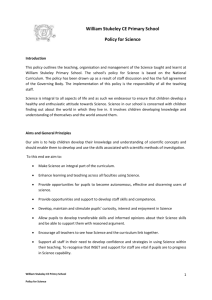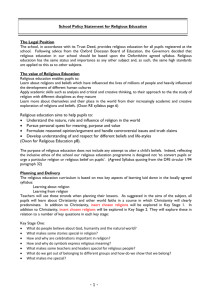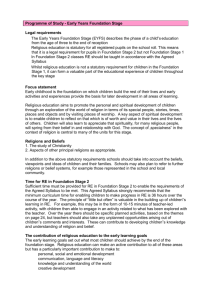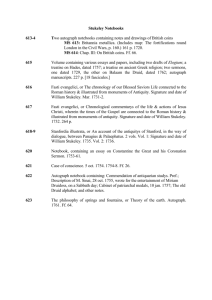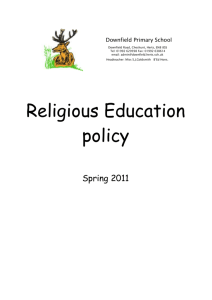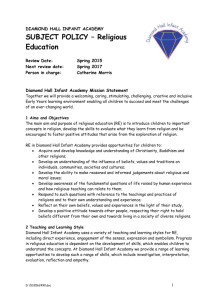Religious Education - William Stukeley CofE Primary School
advertisement
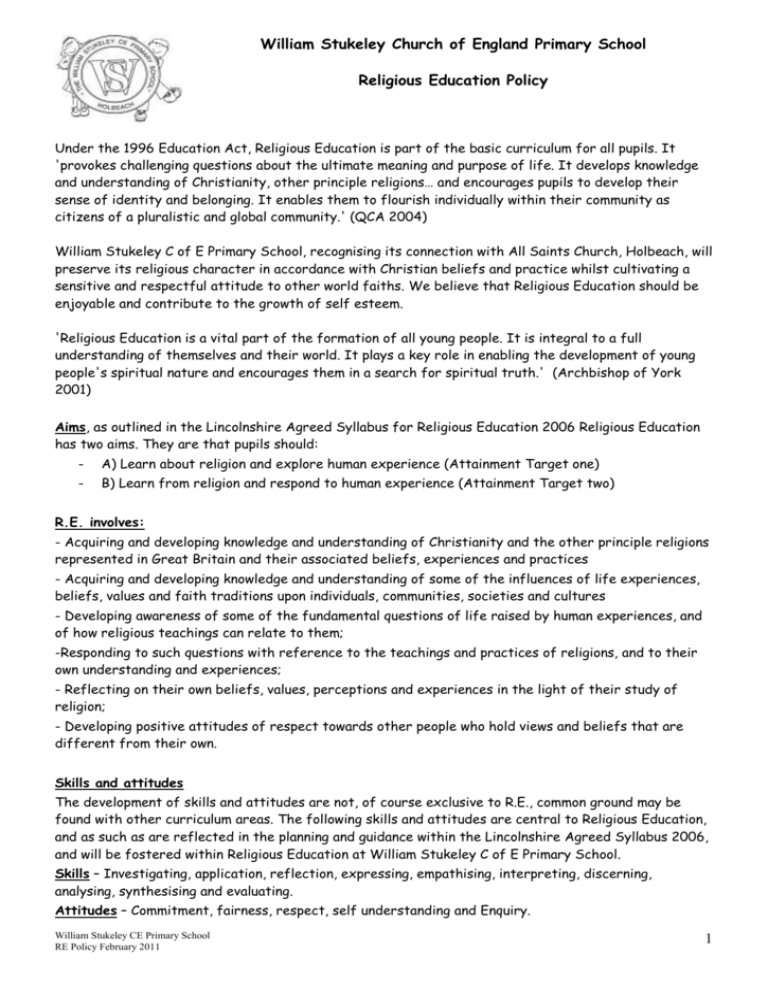
William Stukeley Church of England Primary School Religious Education Policy Under the 1996 Education Act, Religious Education is part of the basic curriculum for all pupils. It 'provokes challenging questions about the ultimate meaning and purpose of life. It develops knowledge and understanding of Christianity, other principle religions… and encourages pupils to develop their sense of identity and belonging. It enables them to flourish individually within their community as citizens of a pluralistic and global community.' (QCA 2004) William Stukeley C of E Primary School, recognising its connection with All Saints Church, Holbeach, will preserve its religious character in accordance with Christian beliefs and practice whilst cultivating a sensitive and respectful attitude to other world faiths. We believe that Religious Education should be enjoyable and contribute to the growth of self esteem. 'Religious Education is a vital part of the formation of all young people. It is integral to a full understanding of themselves and their world. It plays a key role in enabling the development of young people's spiritual nature and encourages them in a search for spiritual truth.' (Archbishop of York 2001) Aims, as outlined in the Lincolnshire Agreed Syllabus for Religious Education 2006 Religious Education has two aims. They are that pupils should: - A) Learn about religion and explore human experience (Attainment Target one) - B) Learn from religion and respond to human experience (Attainment Target two) R.E. involves: - Acquiring and developing knowledge and understanding of Christianity and the other principle religions represented in Great Britain and their associated beliefs, experiences and practices - Acquiring and developing knowledge and understanding of some of the influences of life experiences, beliefs, values and faith traditions upon individuals, communities, societies and cultures - Developing awareness of some of the fundamental questions of life raised by human experiences, and of how religious teachings can relate to them; -Responding to such questions with reference to the teachings and practices of religions, and to their own understanding and experiences; - Reflecting on their own beliefs, values, perceptions and experiences in the light of their study of religion; - Developing positive attitudes of respect towards other people who hold views and beliefs that are different from their own. Skills and attitudes The development of skills and attitudes are not, of course exclusive to R.E., common ground may be found with other curriculum areas. The following skills and attitudes are central to Religious Education, and as such as are reflected in the planning and guidance within the Lincolnshire Agreed Syllabus 2006, and will be fostered within Religious Education at William Stukeley C of E Primary School. Skills – Investigating, application, reflection, expressing, empathising, interpreting, discerning, analysing, synthesising and evaluating. Attitudes – Commitment, fairness, respect, self understanding and Enquiry. William Stukeley CE Primary School RE Policy February 2011 1 Organisation,Teaching and Learning Foundation stage, Key Stage 1 and Key Stage 2 have planned curriculum rolling programmes of topics for all curriculum subjects including RE. Whenever appropriate, cross-curricular links are made within these planned topics. We enable pupils to have access to many different activities involved in learning RE, including field work. When visits are arranged an appropriate risk assessment is carried out. The R.E. curriculum will include planned opportunities to increase children’s skills within ICT. Lessons are planned using guidance from the Lincolnshire Agreed Syllabus. Early Years' learning is planned using guidance from the scheme of work for the Foundation Stage within the Lincolnshire Agreed Syllabus and from guidance from the Early Years Foundation Stage. Time Allocation We follow the legal requirement laid down by the Education Reform Act and provide one hour of religious education each week. It is the decision of the teachers within planning teams, considering the needs of the children and the topic foci, whether the hour is taught in shorter periods or is blocked to provide a concentrated focus. Inclusion A modified R.E. curriculum may be required for pupils who are identified as having a special need. No child will be excluded from R.E. on the grounds of gender or disability. Withdrawal Parents have the right to withdraw their children from Religious Education and a request to do so should be made in writing to the head-teacher. Suitable supervised activities will be provided after consultation with parents. Health and Safety Pupils are expected to use materials and tools safely in accordance with health and safety guidelines. Care must be taken when candles are being used or lit in any area of the school. Assessment, Recording and Reporting Children will be assessed on at least one AT1 and one AT2 each year. These assessments are recorded within the yearly reports to parents. Monitoring The RE Subject-leader keeps samples of children’s work, to show the level of achievement in RE. The RE Subject-leader studies long and short term planning and supports colleagues with any questions or help that they require related to the teaching and learning of RE. Approved by School Development Committee 23rd March 2011 Signed: _________________________Chair of SDC Committe Signed: _________________________ Chair of Governors Date for review: March 2013 William Stukeley CE Primary School RE Policy February 2011 2
